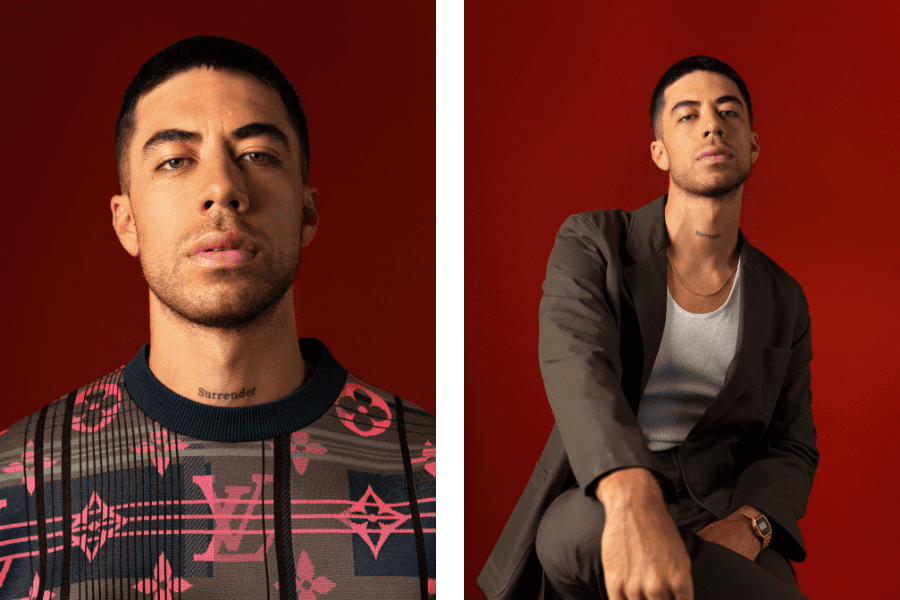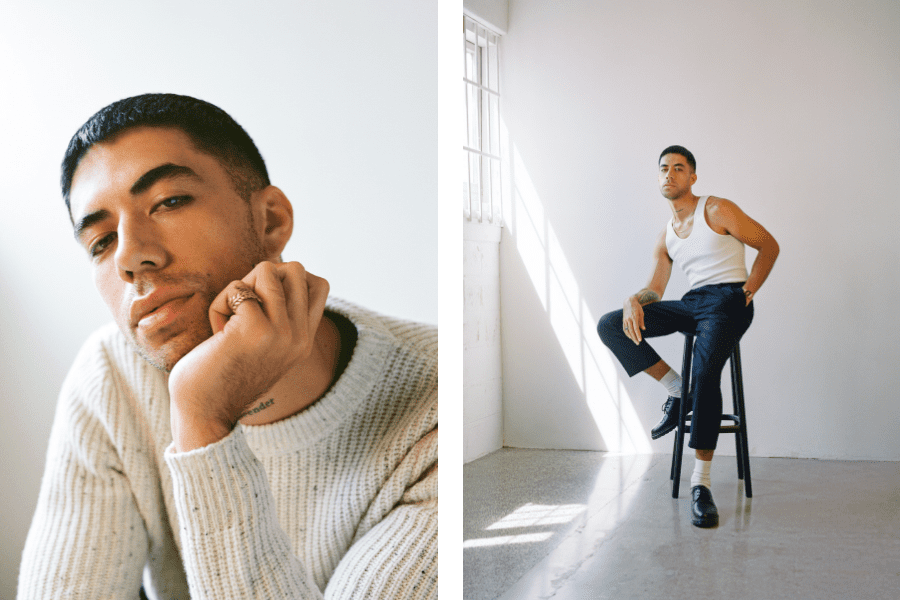As a youngster, Te Karehana Gardiner-Toi, or Teeks, was never far away from singing. A musical father who wrote waiata for kapa haka groups and the lyricism of his native culture, combined with mentoring from other Māori singers inspired him to become the self-assured performer garnering international acclaim he is today.
All good writers know that economy of language is a powerful thing. In an age where anyone with an internet connection can publish an unfettered play-by-play of their every movement and musing, the ability – and indeed, the choice – to say a lot with a little demonstrates a restraint that is, particularly in the case of those with a sizeable platform, increasingly something of a rarity.
Te Karehana Gardiner-Toi or Teeks, as he’s known to friends and, more recently, fans of his music, belongs to this rare breed, capable of deploying a single word to devastating effect. Which is to say, his parents weren’t thrilled about the tattoo.
“I actually kind of surprised myself,” he says, tracing his fingers over the word ‘Surrender’, printed in small gothic font across his throat. “It was pretty impulsive, and I’m not an impulsive guy.”

A moment of post-lockdown mania might’ve played a part, but unsurprisingly given the previous admission, there’s a bit more to it. “I’d been reading all these books on philosophy, kind of going through a process of unlearning and relearning the language that we use every day, and the word just kept jumping off the page,” he says. “Like, what does it actually mean to surrender? All of a sudden it became this really positive affirmation for me; something that could be seen as a strength, not a weakness.”
Like a motivational quote pinned to a dream board, it was an affirmation Gardiner-Toi wanted to see every day, hence the conspicuous positioning that would peeve off even the most laidback parent. “My dad did come around a bit when I told him what it meant… that it was a reminder to surrender to my emotions and not suppress them; to surrender to creativity, to the process of making art; and to just surrender to the present moment. There’s so much going on in our minds all the time, whether we’re stuck thinking about the past or worrying about the future, and I’m sure that’s where most of our stress and anxiety comes from,” he pauses. “I’ve always been overly cautious or critical of myself and every decision I make.”
To say nothing, yet, of Gardiner-Toi’s introspective and carefully considered sound, having observed the 27-year-old both on the set of our cover shoot, and now an hour into our interview, this revelation is not in the least bit shocking. “But I was so much worse as a kid,” he laughs. “I was painfully shy, I could barely talk. I’m so much better now, I can actually have a conversation!”

A middle child of six siblings with three older sisters and two younger brothers, Gardiner-Toi describes himself as a quiet kid who “kind of slipped under the radar at home.” His parents, both educators, moved the family around the country as different teaching opportunities came up. Of Ngāpuhi, Ngāi Te Rangi and Ngāti Ranginui descent, he recalls stretches in Tauranga where his mother’s whanau is from, Rotorua, his father’s turangawaewae of Opononi – a tiny settlement in the Hokianga – and finally Cooper’s Beach in the Far North, where he spent the entirety of his high school years. It was here that music started to bring him out of his shell and he began composing his own songs – a skill picked up largely by osmosis.
“Being a Māori kid I’ve always been around music and singing, whether at home or at school or on the marae,” he says, adding that from a very young age he’d watch his father write waiata for school kapa haka groups, “and then I’d go along with him to training and I loved that. Those memories of hearing the kapa sing… I don’t believe I’d be where I am today were it not for that cultural foundation.”
Not just the source of his innate musicality, Gardiner-Toi also credits Māori culture with informing his lyrical approach to songwriting. “Māori songs are very poetic, and that’s just a function of how the language works. You can see it with whaikōrero, when people get up to speak on the marae. It’s so much more than just words and sentences, it’s a language that forces you to get metaphorical and creative and you learn to be quite witty with how you weave words together and structure a story. I think that’s been an advantage as far as my own songwriting. In high school, the songs I wrote in te reo were always much more sophisticated, but more recently I’ve been able to carry that across to the way I write in English.”
From his first EP The Grapefruit Skies, released in 2017, to his now complete debut album Something to Feel, rolled out in three parts between August 2020 and March 2021, Gardiner-Toi’s still-fledgling career has already seen him evolve from a naive, raw talent with “none of the tools”, to a self-assured performer whose hauntingly soulful sound has not only set him apart among New Zealand’s music landscape, but earned him the endorsement of some of the most influential figures in the global market. They include Yvette Noelle-Schure, long-time publicist to Beyoncé and the late Prince, and mastermind behind the Vogue.com feature that dubbed Teeks “the male version of Adele” and one of the industry’s most promising new artists.

Closer to home, he has found mentors in musical heroes including Tama Waipara and Maisey Rika, who he first connected with in 2014 at Pao Pao Pao, a mentoring programme for Māori artists run across four weekends during Matariki. “I remember we each had to work on a song and when Maisey came around to check on us, I had to sing her my idea. It was one of the hardest things I’ve ever done, but if it wasn’t for that experience, I don’t know if my trajectory would’ve been the same,” he says. That song, ‘Change’, became the first track he laid down on The Grapefruit Skies, recorded in New York with the help of a producer he was put in touch with by Waipara. It was a gesture he’ll be forever grateful for. “But even just the experience of Pao Pao Pao itself and being taught by these people who I really looked up to,” he muses. “That’s quite a big thing for a Māori kid, to see our people doing well in the world.”
It’s a loaded statement that points to the set of circumstances that underpin Gardiner-Toi’s identity as both a person and an artist: colonisation, problematic media stereotypes, and the institutional racism and unconscious bias that contribute to the overrepresentation of Māori men in our country’s crime and mental health statistics.
“Whether it’s in the movies or on the news, the picture you get reflected back to you as a Māori male is predominantly negative, which is so wrong because we have so many amazing stories and values and traits to be proud of as a people. That’s what struck me so much about meeting Tama – this proud, Māori man with a full-face moko, occupying all these spaces that, as a young, rural Māori kid, I just couldn’t begin to imagine myself in. So if I can inspire some other young kid or help open doors they didn’t think were theirs to open? That’s something I’ve been thinking about recently, anyway.”
Key to Gardiner-Toi’s objective is dismantling preconceptions around Māori masculinity. Part of this strategy is educating people on the interplay between the masculine and feminine in Māori culture.
“The most important thing to understand about Māori culture is that we acknowledge ira tane and ira wahine, the masculine and the feminine equally, and that’s because through our whakapapa – our father’s line and our mother’s line – we carry both energies inside ourselves.”

While these energies can manifest as strength and vulnerability, Gardiner-Toi explains that it’s not as simple as male equals strength, female equals weakness. He remarks that Māori society is matriarchal, with women revered as both head and heart of the whānau, and that Pākehā perceptions to the contrary, such as those voiced earlier this year around marae protocol, merely demonstrate an ignorant western perspective “coloured by coloniser texts”.
Further to that, he says, the concept of masculinity and femininity is itself a western construct.
“And we live in a western society so that’s the dominant narrative, these western notions of masculinity and what it means to be a man. Being tough and not showing emotion, real men don’t cry and all that … again, men’s mental health is so closely linked to these ideas, and so that’s something I’ve been internalising for a while and that I now want to consciously communicate through my music, and I suppose my platform. That there’s strength in vulnerability itself.”
Following his sold-out five-stop national tour in December which, by all accounts, saw audiences spellbound, Gardiner-Toi is gearing up to do just that as he takes Something to Feel on the road in the coming months.
“I love performing, it’s my favourite part of all of this, just connecting with an audience,” he says. “I write for me in the sense that it’s cathartic and helps me process stuff. I write to heal myself, not anyone else. But what I’ve realised is that if I’m true to my feelings and emotions then the songs will resonate, because as human beings we all go through variations of the same thing. If I can get up on stage and express myself and show that it’s okay to be open about who you are and not hide your painful experiences…”
He subconsciously rubs his tattoo. “Art should be symbiotic,” he says. “I want it to speak to others as much as it benefits me.”
Photography by Guy Coombes · Styling by Rachel Morton · Grooming by Kiekie Stanners for MAC




